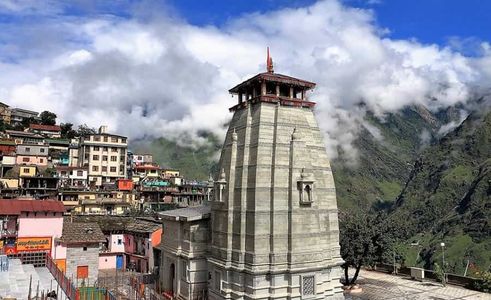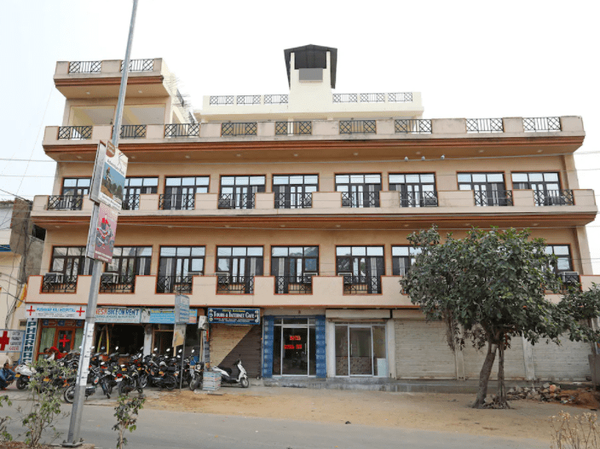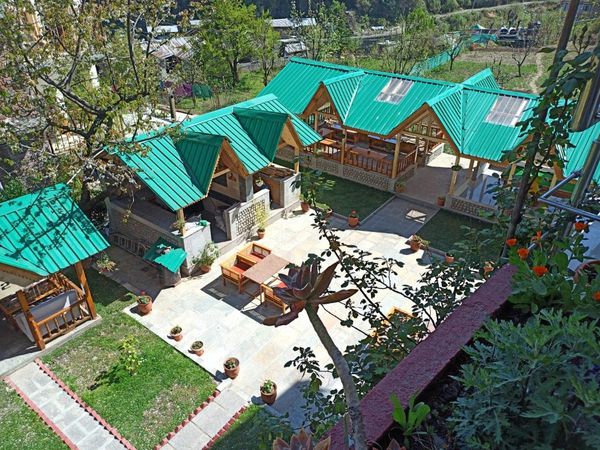10 Places to Visit in Joshimath
 Neha Rawat
07 Jun, 2024
13 mins read
165
Neha Rawat
07 Jun, 2024
13 mins read
165

Joshimath, a significant town in Uttarakhand, India, brims with spiritual sanctity, natural beauty, and adventure. Established by the great Indian saint Adi Shankaracharya in the 8th century, Joshimath serves as a major pilgrimage center and a gateway to numerous treks and tourist destinations in the Garhwal Himalayas. Here's an exploration of ten must-visit places in Joshimath, offering a unique and enriching experience.
1. Narsingh Temple
Narsingh Temple, a cornerstone of the Sapt Badri Yatra, is one of the most revered temples in Joshimath. Dedicated to Lord Narsingh, an incarnation of Lord Vishnu, the temple's idol was established by Adi Shankaracharya himself. The deity here is depicted in a half-man, half-lion form, showcasing an exquisite blend of human and divine features. The temple's architecture is a marvel, featuring intricate carvings and a serene ambiance that evokes a deep sense of spirituality.
During winter, when the Badrinath Temple closes due to heavy snowfall, the idol of Lord Badri is brought to the Narsingh Temple, making it a focal point for devotees. The legend associated with this temple states that the idol's left wrist is gradually becoming thinner, and the day it breaks, the path to Badrinath will be blocked forever. This prophecy adds a mystical allure to the temple, attracting pilgrims and tourists alike.
2. Auli Ropeway
The Auli Ropeway, often referred to as a gondola, is a major attraction in Joshimath, providing an exhilarating ride between Joshimath and Auli. Spanning an aerial distance of 4 km, the ropeway offers breathtaking views of the Himalayan peaks, lush green valleys, and dense pine forests. The 25-minute ride is an unforgettable experience, especially during winter when the entire landscape is blanketed in snow.
Auli is a renowned ski destination, and the ropeway is the perfect start to an adventurous day of skiing or snowboarding. In summer, the verdant meadows and blooming flowers make the journey equally captivating. The Auli Ropeway is not just a mode of transport but a gateway to panoramic vistas and thrilling adventures.
3. Nanda Devi National Park
Nanda Devi National Park, a UNESCO World Heritage Site, is a treasure trove of biodiversity and stunning landscapes. Situated in the vicinity of Joshimath, the park encompasses the Nanda Devi peak, India's second-highest mountain. This pristine wilderness is home to rare Himalayan flora and fauna, including the snow leopard, Himalayan musk deer, and various species of birds.
The park's terrain is characterized by deep gorges, lush meadows, glacial rivers, and towering peaks. Treks through this park offer a chance to witness nature in its purest form, with the Rhododendron forests and alpine flowers adding splashes of color to the rugged landscape. The Nanda Devi National Park is not just a destination but a journey into the heart of the Himalayas, offering peace, solitude, and a deep connection with nature.
4. Kalpavriksha
Kalpavriksha, an ancient mulberry tree in Joshimath, is believed to be over 1200 years old and holds immense religious significance. According to local legends, Adi Shankaracharya meditated under this tree, seeking divine guidance. The tree is said to fulfill the wishes of those who pray earnestly beneath its boughs, and it remains evergreen throughout the year, symbolizing eternal life.
At the base of the Kalpavriksha is the Jyoteshwar Mahadev Temple, dedicated to Lord Shiva. This site exudes a tranquil aura, perfect for meditation and introspection. The combination of the ancient tree and the sacred temple makes Kalpavriksha a unique spiritual destination in Joshimath, offering a sense of timeless wisdom and divine blessings.
5. Shri Shankaracharya Math
Shri Shankaracharya Math, established by Adi Shankaracharya in the 8th century, is a significant spiritual and educational center in Joshimath. This math, or monastery, is one of the four cardinal institutions set up by the saint across India to propagate the teachings of Vedanta and other Hindu philosophies.
The math complex includes temples dedicated to Lord Vishnu, Lord Shiva, and Goddess Lakshmi, as well as a library housing ancient scriptures and texts. The serene ambiance and the chanting of Vedic hymns create a spiritually uplifting atmosphere. Visitors can attend discourses on the Upanishads, Vedas, and other scriptures, gaining insight into Hindu philosophy and spirituality.
6. Bhavishya Badri
Bhavishya Badri, one of the Panch Badri temples, holds a unique place in the spiritual landscape of Joshimath. According to legend, it is the future abode of Lord Badri, where the deity will reside at the end of Kalyug. The temple is nestled amidst dense pine forests, offering a serene and secluded environment for devotees.
The trek to Bhavishya Badri is an adventurous journey through picturesque landscapes, including lush forests, meadows, and mountain streams. The temple's tranquil setting, combined with the legend of Lord Badri's future residence, creates a deeply spiritual experience. Visiting Bhavishya Badri provides a glimpse into the mystical aspects of Hindu mythology and the natural beauty of the Himalayas.
7. Tapovan
Tapovan, situated a short distance from Joshimath, is renowned for its hot water springs believed to have therapeutic properties. These springs are a popular spot for visitors seeking relief from various ailments, especially skin diseases. The area around Tapovan is rich in natural beauty, with verdant forests, rolling hills, and panoramic views of the Himalayan peaks.
Tapovan is also a starting point for treks to Kuari Pass and Bhavishya Badri. The lush greenery, combined with the soothing hot springs, makes Tapovan a perfect destination for relaxation and rejuvenation. The tranquil environment and the natural wonders of Tapovan provide a refreshing escape from the hustle and bustle of everyday life.
8. Ghangaria
Ghangaria, a quaint village near Joshimath, serves as the base for treks to the Valley of Flowers and Hemkund Sahib. This picturesque village is situated at the confluence of the Pushpawati and Hemkund rivers, surrounded by towering mountains and dense forests. Ghangaria is a seasonal settlement, bustling with trekkers and pilgrims during the summer months.
The village offers various accommodation options, including guest houses and tents, catering to the needs of trekkers. Local eateries serve delicious Kumaoni cuisine, providing a taste of the regional flavors. Ghangaria's scenic beauty, coupled with its strategic location as a trekking base, makes it a favorite among adventure enthusiasts and nature lovers.
9. Vishnuprayag
Vishnuprayag, the confluence of the Alaknanda and Dhauliganga rivers, is one of the Panch Prayag and holds great religious significance. This sacred site is surrounded by majestic Himalayan peaks and lush forests, creating a serene and picturesque environment. The ancient Vishnu Temple, located near the confluence, is a revered pilgrimage site.
Pilgrims often take a holy dip in the confluence waters before embarking on their Char Dham Yatra. Vishnuprayag is also a starting point for treks to Kagbhusandi Tal, a beautiful glacial lake. The natural beauty and spiritual ambiance of Vishnuprayag make it a must-visit destination in Joshimath, offering a harmonious blend of nature and divinity.
10. Govindghat
Govindghat, located on the banks of the Alaknanda River, is another important pilgrimage site near Joshimath. It serves as the starting point for the trek to Hemkund Sahib, a sacred Sikh shrine, and the Valley of Flowers, a UNESCO World Heritage Site known for its vibrant floral diversity. The Gurudwara in Govindghat is a place of worship and rest for pilgrims.
The bustling market in Govindghat offers various amenities, including restaurants, hotels, and shops selling trekking gear and souvenirs. The scenic beauty, combined with the spiritual significance, makes Govindghat a popular stop for pilgrims and trekkers. The confluence of the Alaknanda and Lakshman Ganga rivers adds to the charm of this vibrant settlement.
How to Reach Joshimath
Reaching Joshimath is an adventure in itself, offering several options depending on your starting point. The nearest airport is Jolly Grant Airport in Dehradun, approximately 270 kilometers away. From the airport, you can hire a taxi or take a bus to reach Joshimath. The nearest railway station is in Haridwar, about 250 kilometers from Joshimath, with frequent trains connecting major cities in India. From Haridwar, you can take a bus or hire a taxi for the scenic drive to Joshimath. For those who prefer road travel, Joshimath is well-connected by motorable roads, and state-run as well as private buses operate from major cities like Rishikesh, Haridwar, and Dehradun.
Best Time to Visit Joshimath
The best time to visit Joshimath depends on the kind of experience you are seeking. For those interested in trekking and exploring the lush greenery, the summer months from April to June are ideal, offering pleasant weather and clear skies. This period is perfect for activities like trekking to the Valley of Flowers or Auli. The monsoon season, from July to September, brings heavy rainfall and can cause landslides, making travel risky. However, the post-monsoon season from October to November is another good time to visit, with the landscape washed clean and the temperatures dropping. For snow enthusiasts and those looking to enjoy winter sports, the best time is from December to February when Joshimath and Auli are covered in snow, transforming them into a winter wonderland.
Accommodation Options
When it comes to accommodation, Joshimath offers a range of options to suit different budgets and preferences. For those looking for luxury and comfort, "The Tattva Resort" is a popular choice, offering well-appointed rooms, modern amenities, and stunning views of the surrounding mountains. Another excellent option is "Clifftop Club Resort" in Auli, which provides a unique stay experience with ski-in/ski-out access during the winter months. For mid-range travelers, "Hotel Mount View" offers comfortable rooms and essential amenities at reasonable prices. Budget travelers can opt for "GMVN Tourist Rest House," which provides basic facilities and a comfortable stay without breaking the bank. Whether you're looking for luxury or budget-friendly accommodations, the best hotels in Joshimath ensure a pleasant and memorable stay in this beautiful town.
Conclusion
Joshimath is a multifaceted destination that offers a rich tapestry of spiritual, natural, and adventurous experiences. From ancient temples and monasteries to breathtaking landscapes and thrilling treks, Joshimath has something for every traveler. Whether you're seeking spiritual solace, a connection with nature, or an adrenaline rush, the diverse attractions in Joshimath promise a memorable and enriching journey. Each place in this sacred town tells a story of its own, inviting visitors to explore and immerse themselves in its timeless beauty and heritage.
Written By:
Neha Rawat



Hotels at your convenience
Now choose your stay according to your preference. From finding a place for your dream destination or a mere weekend getaway to business accommodations or brief stay, we have got you covered. Explore hotels as per your mood.


